Today has been an intense day, partly because we have reached Pokhara, the middle city, but also because my student Mika Maloney split off from the rest of the team.
She went with a friend of ours on a long journey of her own, to reach Besisahar, the starting point for the Annapurna Trek. If you think of a horseshoe with the round curve on top, like an upside-down letter U, Besisahar is at the bottom right point. The entire Annapurna Circuit is about two weeks of long walking, with its climax at the top of the horseshoe, the Thorung-la Pass, at almost 18,000 feet.
Jenna and I crossed the Thorung-la in the winter of 2000, with Tsampa-la, in the first snowstorm of the season. Mika will not face a blizzard, although she could see snow or sleet. If our paths do not intersect, we will miss each other by just a few days and have promised to leave one another notes at certain points along the Circuit. We know her guide, who will accompany her like a loyal brother for the entire Circuit, so we feel comforted. But we already miss her. Last night, everyone at dinner felt that odd anxiety, the trekker's misgiving about parting ways, the feeling of The (Buddhist) Last Supper, where betrayal is not the problem, but only the poignant inevitability of separation.
Mika, we wish you safe safe and gorgeous travels. We will always be your team.
The town of Pokhara is positively sweltering, 104 degrees Fahrenheit when we landed, before the sun was at its peak. Coffee grows here, and bananas. Fortunately, our hotel rooms have air-conditioning, although Reba pointed out that the AC unit, though set in a beautiful wooden-arch window, has an inch of open sky to every side. Carpentry smarpentry.
Fever birds are calling around me, the koila bird you can hear in Richard Attenbourough's film, Gandhi, when Candice Bergen, playing the photographer Margaret Bourke-White, interviews the elderly Gandhiji during his millionth imprisonment by the doomed British Raj. She is asking him about whether non-violence could be used against a leader as ruthless as Hitler. Not without defeats, Gandhi reasons, because non-violence takes a long time, but in the end, there is no weapon stronger than civil disobedience when used with the right intentions.
Pokhara is a city built on the rim of a lake, Phewa Tal. We see the giant famous Machupuchchare looming over it, Fishtail (just Google this famous mountain and you'll see what is on Ashleigh's and Reba's cameras from this morning). Along with Everest and the Jungfrau, Fishtail is the most photographed mountain in the world. It is a steep pyramid, extremely pointy, a classic, sharp, snow-covered white and ageratum Himalayan peak.
Later, if we have not completely dissolved from this constant sauna, we will take long canoes out, and paddle ourselves over close enough to observe the shore of the wild side, where monkeys and tigers live. Peak season to be here is in the Fall, when the skies are clear. In this season, Fishtail plays hide and seek, but we may, if we are lucky, see the moutain reflect in the lake.
Non-violence takes a long time. My friend Suzi Gablik sent me her most recent blog this morning, where I saw a photograph of cola-colored streaks of the Gulf oil-spill veining horribly upon an Alabama beach.
There is not a single old Tibetan artefact in the Pokhara stalls today, only plastic Chinese copies of junky tourist items, hawked by the Tibetan refugees here who have never, in fifty sad years, been able to go home.
There is a moment in the film version of Out of Africa in which Denys Finch-Hatton tempts Karen Blixen to go on safari with him: "There is land there you ought to see," he promotes, "because it won't be there much longer."
In three days we will be on our way to what must be some of the last land where the Buddhas have always curbed what makes people hasten their own demise.
We will not find this pristine wisdom anymore in Lower Mustang, we are told. But I do still expect to find it in the Resricted Territory. I had better tank up there, before something explodes and plumes all over the Annapurnas, something ruinous and toxic, melting the glaciers, sinking the fish, bludgeoning the Buddhas I love. Jane
Subscribe to:
Post Comments (Atom)


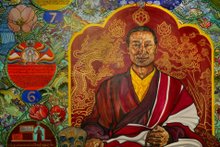
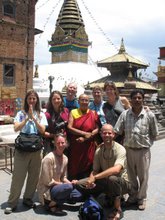



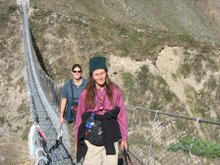
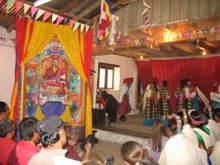
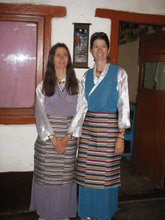
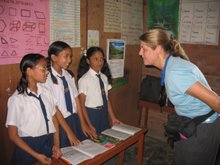

No comments:
Post a Comment